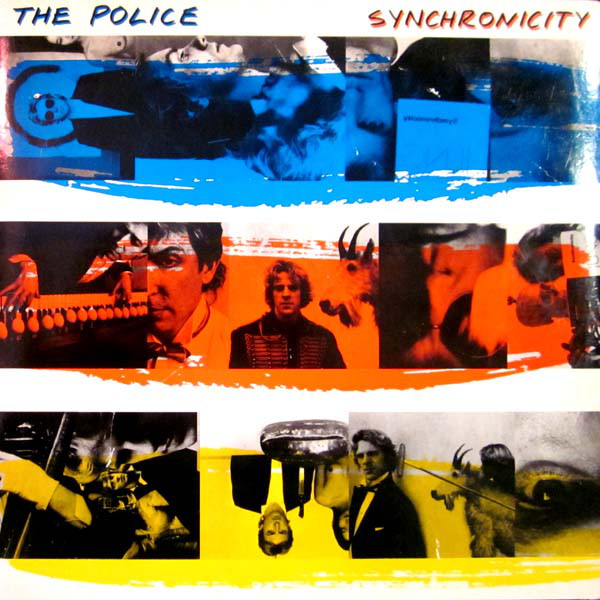
“With one breath, with one flow
You will know, Synchronicity.”
17 June 1983 – The ten song (LP) masterpiece, Synchronicity was released. The Police were everywhere. They were billed as the biggest band in the world. But could they possibly top their last album, Ghost In The Machine? Could they compete with the MONSTER that was Thriller by Michael Jackson? Keep the number one spot longer than the Men At Work album, Business As Usual, who ended 1982 and began 1983 with an impressive fifteen week run? With the exception of a single week (Thriller) during a four and a half month reign on the top of the Billboard Top 100 Albums Chart, they did exactly that. We didn’t know it at the time, but Synchronicity was to be the bands final studio album.
Synchronicity eventually went on to sell eight million copies in the U.S. and went to number one in America as well as the U.K. It was nominated for five Grammy Awards and won three. The band also scored it’s biggest hit in Every Breath You Take. The song held the number one spot for eight weeks and was the best selling single in 1983. It was also the fifth best selling single of the entire decade. By this time, Michael Jackson was truly their only peer. And they knew it.
“They say the meek shall inherit the earth.”
What was going on behind the scenes? What was driving this band to make an album with such greatness? Was the tension between the band as bad as people say it was?
I had the pleasure of catching up with drummer, Stewart Copeland, to talk about all things Synchronicity. I wondered if it feels like something that happened thirty-five years ago. Stewart Copeland tells SoundVapors, “Thirty-five years does sound like a long time. For all of us it was such a big event in all of our lives but was actually just a small fraction of our lives.”
Wanting to know about the atmosphere around the band when they recorded Synchronicity, I jumped right in and asked Stewart Copeland what the feeling was like at that time. He doesn’t sugar coat it at all. He says, “It was miserable. We all hated it. We didn’t hate the music, we all stand by the music but the experience of making it.. was very painful. For all of us. But we’ve all hugged it out. (laughs) We understand what the issues were and we respect where those positions came from and have achieved an armastus. We appreciate what we achieved there, but man it was hard, very difficult, emotionally.”
“Take the space between us. Fill it up someway.”
“Any artistic collaboration is an artistic minefield, says Stewart.”
Stewart continues, “It was really important to each of the three of us, that it was right. We cared about it and there were no passengers in The Police. There was nobody to say, yeah sure, if you guys like it, sure that’s fine. Nowadays, I would totally be happy to be a passenger. Somebody’s got a beef about something, they think there should be a saxophone solo instead of a guitar solo.. fine, it’s all music. But when you’re young, you subscribe to the notion that there is only one musical truth: MINE!” (laughs)
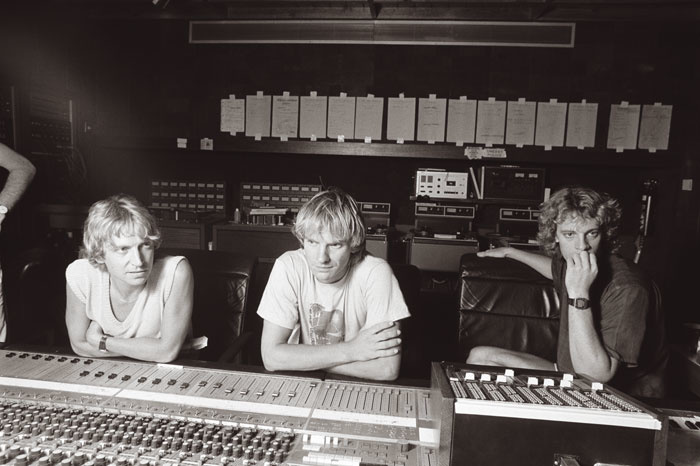
I ask Stewart to tell me what that tension looked like on a daily basis. “Everyday we would start, and this is the same with the reunion tour, everyday I would like to think we all started with the right attitude. But we would just be up against it. Here I am, the musical truth has been revealed to me and here I am with somebody that I know is really, really talented. And has all kinds of musical truth that they bring to the party but it’s just this relentless non, unbending acceptance of the fact that my musical truth could be the musical truth, and this can be frustrating. I’m being ironic here, of course. It’s not that the other idea were wrong. In fact, in many cases, it is that they were right. It was just that, what made The Police what is was, was three different sensibilities. Which meant in any great compromise, and technically it was a compromise but actually, artistically it was something quite powerful and distinctive. It was really an artistic struggle.”
“Oh mother dear please listen and don’t devour me.”
So was there tension 24/7? Stewart says, “Socially, over dinner we all got along pretty well. Still do to this day. The strange thing is, the three blonde heads, we really get along great until somebody mentions music.”
Speaking of musical truth. When I was growing up, Stewart was my favorite drummer. In fact, I published a TOP TEN FAVORITE DRUMMERS list on this site a while back, and Stewart was first on that list. So naturally, I needed to ask some drum questions. I asked him if he used the same drum kit on Synchronicity as he did on Ghost in the Machine and Zenyatta Mondatta. Stewart explains, “Yes, it was. I had three drum sets at the time that were identical. One that was over in Europe, one that was a touring kit. Jeff Seitz, my drum tech, had three kits and he would send the cymbals but the kit would stay in New York or wherever. So which of those three.. it was the midnight blue kit. The Shea Stadium kit.”
“Is anybody alive in here? Nobody but us.”
As per usual Stewart had a great overall drum sound and his snare drum cut through the mix to an ear pleasing level. Stewart says, “That sound was brought to us by Hugh Padgham (producer, engineer). We had no idea how you do that but that was the trick he had up his sleeve. Which was a mixed blessing. He got a fantastic sound out of the drums by this crazy idea of putting the drums in the living room. So they sounded really great but something that we can now look back with hindsight, like a shoulda, coulda, woulda. Putting the drums so far away from the other two guys, decreased the human bond between us. I would be up there looking at a television monitor of the other guys. Now it wasn’t really the other guys, it was Andy in the big room and Sting in the control room playing his bass. While we were doing the backing tracks, it was quite tense. They are impatient because they want to get the track down so they can have fun with their guitar overdubs, singing and the fun stuff. But before they get to play with the track, Stewart has got to get his fucking drum part right. (laughs) So since we were young, hot headed and not the nurturing souls that we are today, I’m up there in the dining room looking at this screen of very grumpy band mates. We’d do a take and I’d look down and there’s like furrowed brows, looking at the floor or looking at the ceiling. I’d say, Guys how was that?? Nothing. Then I’d hear Hugh, patiently into the mic, uhh let’s do another take.”
Sounds like there were some, not only tense times at AIR Studios in Montserrat, it sounds like there were a few challenges to overcome as well. Stewart tells me about one of the biggest challenges that he now thinks is kind of cool. “I didn’t realize until years later that it was kind of cool but at the time it was merely challenging. But Andy and I never heard those songs until about 20 minutes before we recorded the backing track. Andy got a chance to reconsider his guitar part and think about them deeply and spend days experimenting with different instruments, different amps and settings. All kinds of cool stuff. Sting could have many happy hours laying on vocals and saxophone, even. But none of that party could begin until Stewart got his part right. So there was a lot of pressure there and these drum tracks were recorded by a guy that only heard the songs 20 minutes previously. So that drum fill going into the chorus was not some carefully considered piece, rehearsed over months. The groove I came up with was whatever I came up with right then and there. It was completely spontaneous.”
“Packed like lemmings into shiny metal boxes.”
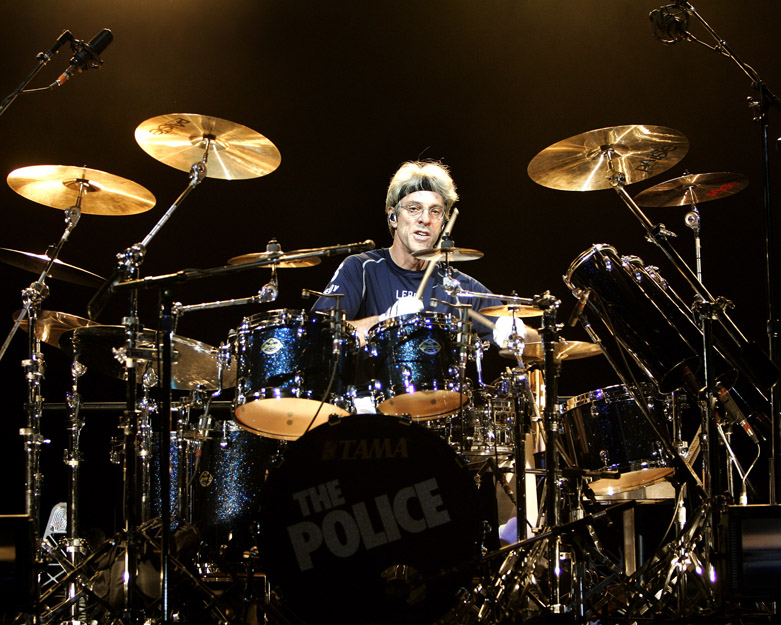
I asked him how long they did it like this. Stewart tells me, “The first album not so much because we had those songs for a while. But certainly by the time of Synchronicity, it was immediate recording after first exposure to a track. And there’s a certain immediacy to it. So sure enough when we would go on tour and play these songs, you’d figure it out. By show three I’d finally figure out how to get out of the chorus and back down into the verse. Easy-peasy but it’s not like that on the record. On the record it’s this sort of uncomfortable switch. But you know what? The record kind of works.” It totally works. But I still think about those quick snare fills in Synchronicity I and marvel at how they fit so perfectly. Especially after hearing what Stewart says about the lack of preparation.
I ask Stewart to go even deeper. To give us a specific example or an extreme example of what he is talking about. He obliges and says, “The extreme of that, is a song called Murder By Numbers. We are sitting at the dinner table and Andy’s plunking on his guitar with his sophisto jazz chords and Sting loves that shit. He pulls out his book and he’s got a lyric for that. And they’re sort of working it out at the table there. Shit so let’s do one.. So they walk downstairs and the drums are only twenty feet away and I walk over to them. I then start to figure out that rhythm. (Hi-hat/Rim shot/Kick drum) I’m still playing that by the time they get down to the recording room. So I’m already playing when they plug in their amps and Hugh switches on the tape machine to record and it’s already in progress. They pick it up and just lay the tune down one time and that’s the record.” About this time, I am simply amazed. Stewart then says, “We didn’t even run it through one time. That was it! The first time it was ever attempted, that was the recording.”
“Since you’ve gone I been lost without a trace.”
As I mentioned at the top of this article, there were ten tracks on the LP version of Synchronicity. This did not include Murder By Numbers. It was put on the cassette and CD versions of the album. Having only listened to the record on vinyl as a kid, I was unaware of that song. It wasn’t like it is today with the internet and everything available pretty much on demand. You owned the album and maybe heard a deep cut on the radio if you were lucky. When I first heard Murder, I was mesmerized by the song and wished it was on the LP version, even though Tea in the Sahara is one of my all time favorite vinyl album closers.
As Stewart and I are talking about it he says, “That song was done, to be on the album but we ran out of space on the vinyl album. Now with the wisdom of hindsight, I realize that, that’s one of the coolest tracks we’ve ever recorded. The thing is, my favorite Police tracks are not our big hits. That’s why I did so well in my life, by association with Sting-o. That guy can spot a hit. His favorite songs are also the ones that the world agrees with, that are fucking great songs.”
“There’s a little black spot on the sun today, that’s my soul up there.”
So what is his favorite song on the Synchronicity? Stewart takes a second and the first song he mentions: “Tea In The Sahara.” He then says, “I know Bring on the Night is an earlier album, but that’s my all time favorite Sting song.” So I say, “What about your song, Miss Gradenko?? That’s certainly one of my favorites on the entire album.” Stewart exclaims, “I found the notebook where the original lyrics are in and there’s more lyrics! They are about North Korea. It’s kind of relevant. They’re not allowed to have a relationship but they do. Humans are like that. You put them in tight uniforms and try to shut them down but they will fall in love! Are you safe Miss Gradenko? Not only are you safe.. but are you safe for me?”
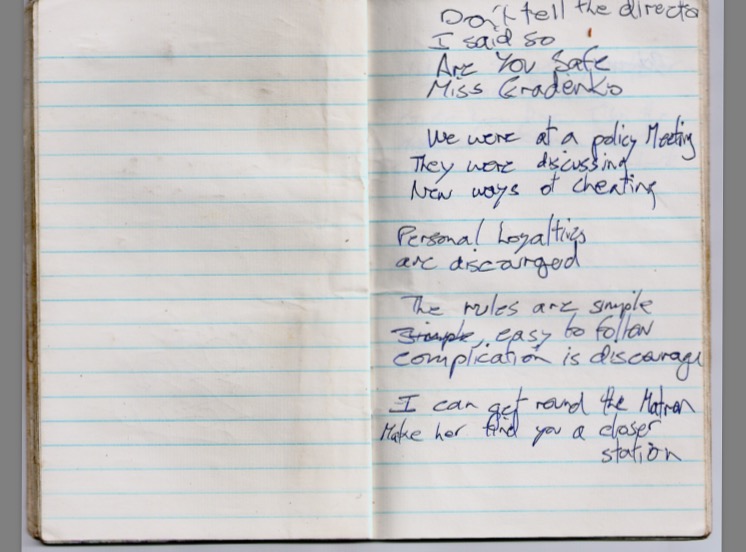
Synchronicity was the final studio album by The Police. I keep a running list of bands that I wish would come together and record new material. At the very top of that list sits The Police. Here’s what makes it even harder to accept that there is not a new album. I listen to the recent Andy Summers rock project Circa Zero and imagine what Sting could have sounded like singing over those terrific guitars that bleed the classic Andy Summers tone. Then when I listen to Stings latest solo album 57th & 9th, I dream about a Stewart Copeland drum track combined with Andy picking those arpeggios on Pretty Young Soldier while “Policing the songs up”.
“I can see the destiny you sold turned into a shining band of gold.”
I wondered how close the band was to actually recording new material during the reunion tour in 2007-08 and if there was any pressure to do so. Stewart tells me, “We were very close. We tried but I think Sting just dried up. He tried to write some songs and needless to say we are surrounded by people for whom the idea of a new Police record would probably be a greeeat idea! (laughs) Andy and I didn’t get as much pressure from that because we were not the front of that new song. It was a little more relaxed for us. But ole’ Sting-o, oh my God he’s gotta write something! And understandably the juices or the gift of creativity did not occur in that environment. And also, new material is not what a Police show is all about. Or what the Police now is all about. To the extent that there is a Police now, it wouldn’t be about new material. It’d be about the listening. That body of songs have real emotional power because they’ve been here for 30-40 years. Sting writes a great song. The wrong place for it, is The Police, Why should he be arguing with Stewart about this, or Andy about that? Why should he be struggling with that when he knows exactly how to make a record. That song that he’s got, he knows exactly what to do with it.”
Stewart is not wrong. But that “IT”, that Stewart and Andy bring to a song is the reason why people dream of one day hearing a new song from The Police. Stewart and I politely and jokingly disagree on this point. And the truth is, he is correct in mostly every way. Except from the public or fan perspective. Will that produce a new record from The Police? No, it will not. But the demand is there regardless of our viewpoints. I think that is something everyone can acknowledge. It’s part of the reason why we are here thirty-five years later talking about Synchronicity. These guys changed music and that album remains one of the greatest albums ever made. Even as time moves on and technologies change, the creativity and performance on that album prevents it from being forgotten in a sea of an infinite amount of music being released every year since its release.
“You have the means in your possession.”
Although we may never get another recording from The Police, we have been fortunate to have five full length albums to enjoy. It’s almost poetic that Synchronicity was the bands last album and they truly went out on top. How many bands actually do that and leave when they are at their absolute pinnacle and at the height of their popularity? If there is a number, I’m quite certain it is a low one.
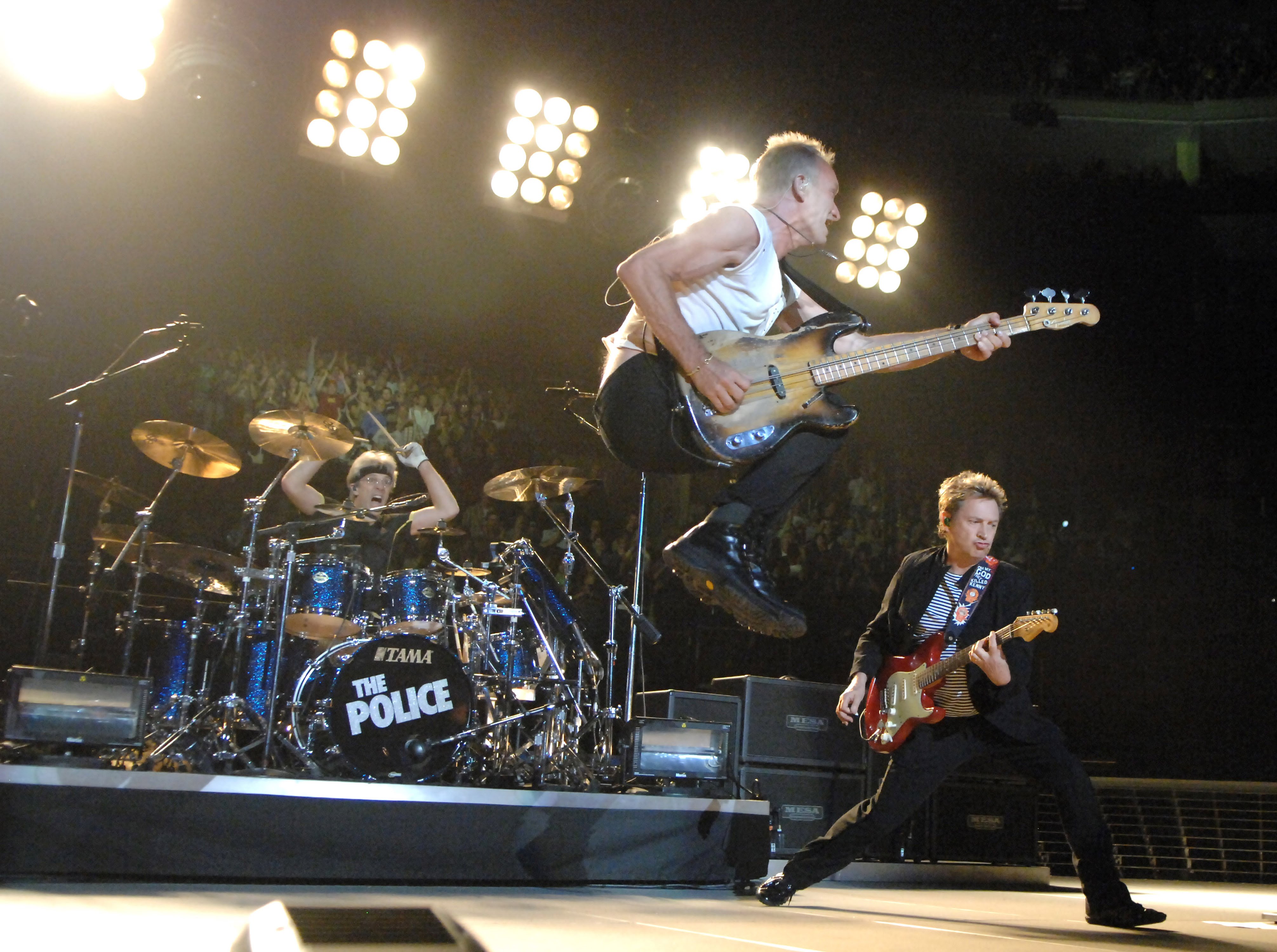
After reading this, I urge you to take forty-three minutes and thirty-eight seconds, close your eyes and listen to Synchronicity from start to finish. If you are familiar with the album you will once again be reminded of its greatness. If you have never listened to the entire album or have only heard Every Breath You Take at a wedding, do the same and take notes on what a masterpiece sounds like.
“You’ll find your conscience bothers you much less.”
At the end of our conversation I asked Stewart to tell us something that makes him happy about that time. Stewart says, “I do like.. the knowledge that what we did was really cool. Ya know, when Andy would hit one of those riffs.. it was fucking great! Man, that’s exciting. I am playing with the best guitarist on the planet. That is.. well, I’m really lucky I ended up here. And the same with those songs to play. Sting would hit the mic and starting singing – FUCK ME! This is what people pick up instruments to do, is to have the kind of collaboration and achieve that kind of power with music. That’s the upside.”
Finally a message from Stewart to fans of The Police: “Remember, Love.”
Track listing:
Synchronicity I
Walking in Your Footsteps
O My God
Mother
Miss Gradenko
Synchronicity II
Every Breath You Take
King of Pain
Wrapped Around Your Finger
Tea in the Sahara
Murder by Numbers
Sting – Andy Summers – Stewart Copeland
-Tommy Marz
Follow Tommy and SoundVapors on Twitter.
For More On The Police & Stewart Copeland Visit
8 thoughts on “Interview: Stewart Copeland – The Police – 35th Anniversary of Synchronicity”
very emotional for me to read this …..the police are for me the gratest band ever and reading this make me very emotional
I agree, The Police rule!
Fantastic job Tommy and how lucky for you to meet him! If I may suggest a little correction, where you quote Stewart saying “We understand what the issues were and we respect where those positions came from and have achieved an *armastus*”, I believe the word he actually used is “armistice”.
Good eye! But I was going for the Estonian “armastus” as pertaining to “love”! And thanks for reading!
Congrats for this amazing interview from all of us at StewartCopeland.net (the link is now on line on our main page and news section!)
Giovanni – SC.net
I have the Opportunity to share stage with The Police in venezuela when they was on the ghost in the machine tour, since that moment my concept and drumming change for ever. Today I have a tribute band in miami. Thanks God for let us live this moments
Zendattatribute band. Follow us. See you soon
More please.
I’d like to know on which day the interview took place – and if it was done at the Sacred Grove or by telephone… I would love to use the Information on The PoliceWiki Website – here’s a sample page so that you can see how Information is used: http://thepolicewiki.org/Police_wiki/index.php?title=2013-01-21
Comments are closed.